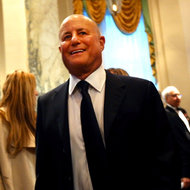 Yana Paskova for The New York TimesRonald O. Perelman, the chairman of MacAndrews Forbes, was once one of the country’s most successful corporate raiders.
Yana Paskova for The New York TimesRonald O. Perelman, the chairman of MacAndrews Forbes, was once one of the country’s most successful corporate raiders.
Opening arguments are set to begin Tuesday afternoon in trial covering the dispute between the billionaire financier Ronald O. Perelman and his former business partner.
Lawyers representing both Mr. Perelman and Donald Drapkin, the former business partner, were in court on Tuesday morning to settle some last-minute issues and select a jury for the trial, which is expected to last roughly five days. The two men are in court fighting over whether Mr. Drapkin violated a separation agreement he signed in 2007 when he left MacAndrews Forbes, Mr. Perelman’s company.
The dispute has created a lot of buzz on Wall Street, in large part because Mr. Drapkin and Mr. Perelman are haggling over roughly $20 million. While the sum is hefty by most standards, it’s not a big amount for the likes of Mr. Perelman, who is estimated to worth more than $12 billion. Mr. Drapkin’s net worth is not known but he too is very wealthy and now runs a Wall Street hedge fund.
Tuesday morning, the love life of Mr. Perelman — who has been married five times, including once to the actress Ellen Barkin — provided some levity for the 21 prospective jurors, who were questioned by a federal judge, Paul G. Gardephe, for roughly two hours.
“Is this the Ronald Perelman who was married to Ellen Barkin,” one juror asked the judge, eliciting laughter in the courtroom. “I have met him a few times through Ellen when they were together.”
Judge Gardephe asked whether that would prevent the juror from being impartial. “Yes, probably,” the juror responded, laughing. He was immediately excused from the jury pool.
“He is all over the news,” another juror said of Mr. Perelman. Only four jurors had heard of Mr. Perelman – and none had heard of Mr. Drapkin.
Jurors in the case will have to decide whether Mr. Drapkin violated the terms of the separation agreement he signed when he left MacAndrews Forbes. At issue is whether Mr. Drapkin hung on to work product he had agreed to return and whether he tried to persuade a MacAndrews Forbes employee to leave the firm.
Mr. Perelman was not in court Tuesday morning, but he was represented by more than half a dozen lawyers and his public relations chief. Mr. Drapkin, wearing cufflinks and a deep blue tie, was there and was scheduled to testify this afternoon. He was also accompanied by several lawyers.
In the end, an eight-person jury was selected. The judge peppered prospective jurors with questions, including their hobbies, what they did for a living and what publications they liked to read. Three of the prospective jurors said they liked the show “NCIS,” a police drama on CBS. One was a fan of the show “American Greed.”
The jury that will hear the trial includes an unemployed actor, a college professor, a nurse who is a fan of Rachael Ray and a 59-year-old woman getting her associates degree in criminal justice.
Some of the more colorful juror candidates didn’t make the final cut. Juror 22, a bus operator, who was excused, was asked what he did in his spare time. His answer: “drink.”
Another had been at medical school with one of the crucial witnesses in the trial. When asked whether this would compromise her ability to be a juror, she said she wasn’t sure whether she remembered him. “It’s possible he could walk in and I’d recognize who he is and say, ‘Oh, he yelled at me when I was a resident,’ or something,” she said.
At one point the judge made reference to the vast wealth of the two parties involved.
“Both the rich and the poor are entitled to justice in our system,” Judge Gardephe told jurors, asking them not to be influenced by the size of their bank accounts.
Article source: http://feeds.nytimes.com/click.phdo?i=5c65b5b19503ca2cc27ca298219c50f3